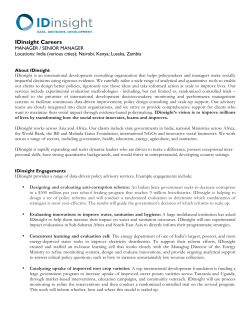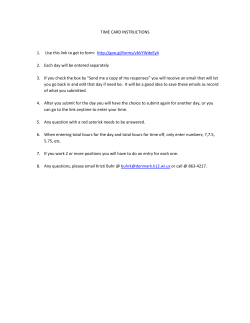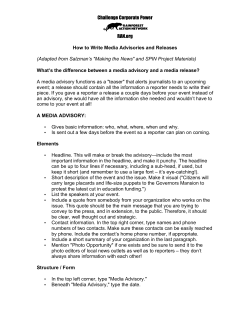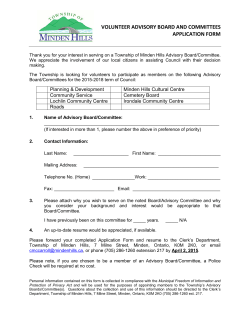
Presented by: Heidi Dye Program Coordinator Children’s Home and Aid
Presented by: Heidi Dye Program Coordinator Children’s Home and Aid 1. 2. 3. Share with each other your frustrations/ successes Walk away with new ideas to use in your program Be encouraged to persevere! Focus on three areas that are critical to the success of your programs: 1. 2. 3. Organization Parent Involvement Advisory Board • Do a “brain dump” daily and prioritize your list with H,M,L • Have a regular time/day of week to do data entry • View your calendar daily/weekly to make sure you don’t miss any meetings/deadlines • Respond to emails immediately if possible; putting it off may mean it gets neglected • Give yourself “office hours” weekly to make sure the administrative work gets done • Helps everyone be on the same page (parents, administration, staff) • Helps you to plan effectively for this year and following years • Gives you a picture of what you should be planning for next • Can be used for: Event-planning, recordkeeping, compliance for grants, field trip planning, meetings, etc. • Label everything • Keep all similar folders together • Save one copy of every flyer you create • For events: save receipts, write down a reflection of what went well and what you would change, record how many people attended What organizational strategies have worked for you? What area would you like to grow in? What is one new strategy you will try? Parental Engagement How are the families in these pictures similar/different than those at your school? • Change your vocabulary from “parent engagement” to “family engagement” Benefits: Do not have to provide childcare Less behavior issues More participation (children are our best recruiters) Teaching parents how to have healthy family interactions Building memories together • Look at who is already volunteering in the school and get them on board! Parents will recruit other parents. • Do classroom “commercials” for parent/family programs. Students will get the parents there if they are excited. • Get to know security guards and other “gatekeepers” at the school; they will help you get information out to parents. • Keep it simple!!! (able to be duplicated) • Try to tie parent events to other things that are going on in the school (i.e. report card pick up, graduation meetings, PAC, LSC, etc.) • Parents will come out for: food, raffle prizes, and seeing their students perform. • Assess the needs/interests of parents through regular surveys (formal or informal) • Walk around during programming • Be present at school events (i.e. report card pick up, pep rallies, meetings, committees, etc.) • Greet parents as they come and go • Whenever possible, go above and beyond to serve the needs of the children; parents will invest if they feel invested in. Communicate ways regularly and in a variety of Tell them the good things about their child See parents as an asset to your program How successful is parent engagement at your school? What is your biggest obstacle? What is one new strategy you will try? Purpose of Advisory Boards: Builds/strengthens partnerships and relationships Delegates work to a team Potential funding avenue Gives all school stakeholders a voice (i.e. parents, staff, students, community members, businesses, etc.) 1. 2. 3. 4. 5. 6. Start on time and end on time. Encourage your members to get to know each other by doing an ice-breaker. Evaluate data. Plan events together, and give everyone homework. Send follow-up emails to remind everyone what they committed to, and attach an agenda for those who were not present. Celebrate successes together! Let them know they are a valuable part of the team! Do you have an advisory board? Has it been a positive or negative experience? Do you have a different outlook after hearing this presentation? If you would like a copy of the power point or have any feedback or questions, you can contact me at : hdye@childrenshomeandaid.org THANK YOU FOR COMING!!!
© Copyright 2025





















